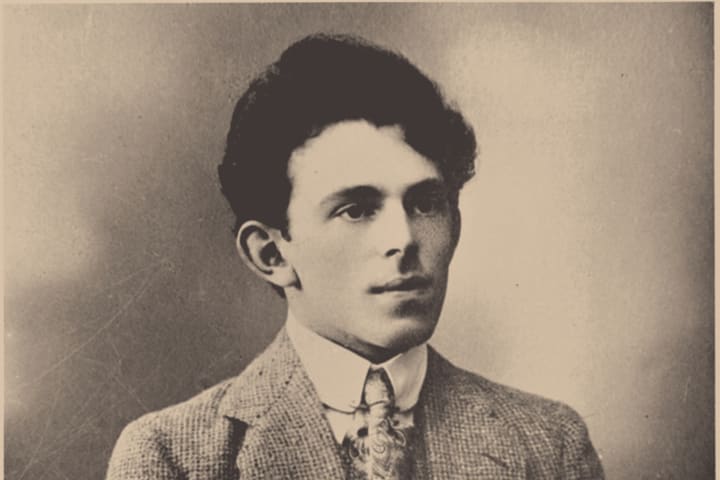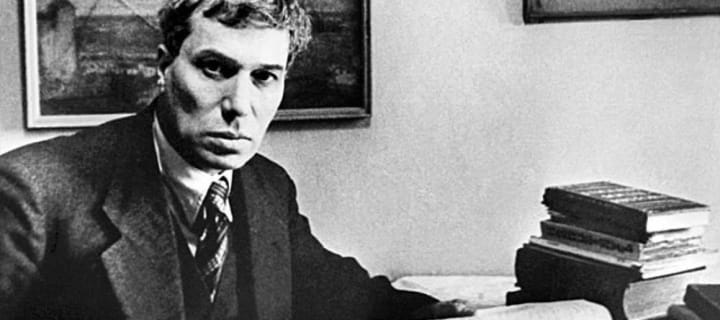Anna Akhmatova
b. 23rd June, 1889 to 5th March, 1966

Anna Akhmatova was one of the most well known poets in Russian History and is, to this day, one of the most respected poets of the 20th century. I read Akhmatova's poetry whilst I was in school via a tiny book I found called "The Everyman Poets: Anna Akhmatova". She uses so much incredible language with such raw emotion and the quotations about imprisonment and love have such a vivid image to them. Anna Akhmatova was the basis for reading all Russian Poetry of the difficult ages, the transition between Royalist Russia to Communist Russia. She was the borderline between those who were on the outside of the situation and those who were on the inside, and by inside, I mean prison.
Biography

Anna Akhmatova was born in Odessa in 1889. When she was young, her family moved north and more towards the area of St. Petersburg. She then moved to Kiev and finished her schooling there. Her parents separated in 1905 and she attended Kiev University for a year before transferring back to St. Petersburg.
She was inspired to write poetry by other poets such as Jean Racine and Alexander Pushkin. She adopted the name 'Akhmatova' in order to publish the poetry, not writing under her real surname - 'Gorenko'. Nikolai Gumilev encouraged her to write more poetry and yes, he made marriage proposals to her that started in 1905. She married him in 1910, even though she stated herself that she may or may not love him - but it was her fate to be his wife since he had loved her for many years.

In 1910, she formed the guild of poets with other poets of the time such as Mandelstam and Gorodetsky. In this circle, craft was the key to poetry rather than the thematic additions and explanations which the symbolists before them worked from.
She was painted by an Italian Artist in Paris and returned to him later to have more paintings done of her. She became first and foremost famous for posing for these paintings and having her poetry out there. Her allure and intelligence was more famous than most other people in Russia at the time and in her location.

The Guild of Poets published Anna Akhmatova's poetry book "Evening" in 1912 and it quickly sold out completely, receiving numerous positive reviews for her incredible use of language and craft. The book only includes 35 of the 200 poems she wrote in 1911 - she was highly selective of which ones she included, showing the Guild of Poets' craft and choice of the best crafted poetry in their collection. But it was her 1914 collection "The Rosary" that would solidify her image and poetry as the most popular of the day. Thousands of people composed poetry addressed to Anna Akhmatova as love poems, dedications or inspirations of her poetry. It was surely a beautiful Silver Age of Russian Literature.
Anna Akhmatova became really good friends with Boris Pasternak and Alexander Blok and as she wrote her next pieces of poetry, the totalitarian government of Russia was growing, spying was growing more intense and the Silver Age of Russian Literature was at an end. In her poetry collection "White Flock" (1917) - she writes a lot about her relationship with the poet and artist Boris Anrep. Joseph Brodsky especially loved this collection, referring to it as a 'controlled terror'.

In 1917, the Russian Revolution began and things began heating up, her friends were dying around her and people were being arrested left, right and centre. Akhmatova's poetry during this time becomes increasingly dark and has themes of imprisonment and death. In 1918, she divorced her husband and married and Assyriologist. This caused even more darkness and depression in her life seeing as her life was now the centre of the literature social circle in Russia.
The composer Arthur Lourie would put many of Akhmatova's poems to music and yes, he too had an affair with her.

In 1921, Anna Akhmatova's ex-husband was arrested along with a bunch of others for conspiring against the revolution. They were all shot in the August of that year. The executions were becoming more and more frequent and had a massive impact on writers like Akhmatova, Maxim Gorky and others during this time.
In 1925, Akhmatova's work was unofficially banned in Russia. She went through what was called the 'vegetarian years' in which she became a literary critic and wrote reviews, translations etc. She was denied access to academic institutions due to her parents alleged anti-revolutionary activities and she had little food and money to support herself. Though some of her friends were sent to labour camps, Akhmatova only narrowly escaped arrest. Her son was imprisoned numerous times and yet again, Akhmatova's poetry turned dark and disdained. It was a horrid time for her. Some of her friends even committed suicide.

In 1939, it was found that Akhmatova was put under serious surveillance by Stalin and his men. Akhmatova would witness the Siege of Leningrad (St. Petersburg) and wrote poetry concerning the horrors of the Second World War. She was evacuated in 1942 and went to Uzbekistan where she became seriously ill. Upon her return and the end of the war, she was condemned for visiting the writer Isaiah Berlin and the revolutionaries were still spying on her. During this time, her son was yet again arrested in 1949 and sentenced to ten years in a Siberian Prison Camp.
Be that as it may, as the USSR became more and more popular, they sought to establish the intelligent arts of their country by permitting Akhmatova to travel again and changed the nature of her image throughout Europe to one of the last remaining poets of the Silver Age and therefore, a respected figurehead of literature. In 1965, Anna Akhmatova had a heart attack and went to hospital but was released. She would die of heart failure a year later. After an open coffin funeral, she was interred in the St. Petersburg Komorovo Cemetery

This is my favourite poem by Anna Akhmatova
In Memoriam, July 19, 1914
We aged a hundred years and this descended
In just one hour, as at a stroke.
The summer had been brief and now was ended;
The body of the ploughed plains lay in smoke.
The hushed road burst in colours then, a soaring
Lament rose, ringing silver like a bell.
And so I covered up my face, imploring
God to destroy me before battle fell.
And from my memory the shadows vanished
Of songs and passions—burdens I'd not need.
The Almighty bade it be—with all else banished—
A book of portents terrible to read.
- Anna Akhmatova
About the Creator
Annie Kapur
200K+ Reads on Vocal.
English Lecturer
🎓Literature & Writing (B.A)
🎓Film & Writing (M.A)
🎓Secondary English Education (PgDipEd) (QTS)
📍Birmingham, UK






Comments
There are no comments for this story
Be the first to respond and start the conversation.